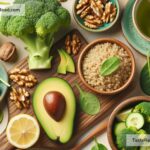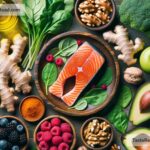Foods for Reducing Chemotherapy Side Effects: A Simple Guide
Chemotherapy is a challenging process, often bringing side effects that can make life difficult for patients. These side effects can include nausea, fatigue, diarrhea, constipation, mouth sores, changes in taste, and a weakened immune system. While food cannot cure cancer or eliminate side effects, eating the right foods can help make these challenges more manageable and support the healing process.
In this blog, we’ll explore foods that can reduce chemotherapy side effects and help patients feel more comfortable. These suggestions are easy to understand, simple to follow, and focused on nourishing the body.
1. Stay Hydrated: Water-Rich Foods and Fluids
Chemotherapy can cause dehydration, especially if you’re experiencing vomiting or diarrhea. Staying hydrated is essential for keeping your body strong. In addition to drinking water, focus on eating foods with a high-water content. These include:
- Fruits: Watermelon, oranges, grapes, strawberries, and cantaloupe.
- Vegetables: Cucumbers, celery, and zucchini.
- Soups and Broths: Warm broths are gentle on the stomach and can help hydrate your body.
Sometimes plain water might feel unappealing, so you can try herbal teas, coconut water, or homemade fruit-infused water.
2. Combat Nausea with Bland, Comforting Foods
Nausea is one of the most common chemotherapy side effects, making it hard to eat. Bland, easy-to-digest foods can be helpful:
- Crackers and Toast: Dry and plain options, such as saltine crackers or whole-grain toast, are soothing for the stomach.
- Bananas: A soft texture and mild flavor make bananas ideal for calming nausea.
- Rice and Potatoes: Plain boiled rice or mashed potatoes can be filling without upsetting your stomach.
Ginger is known to help with nausea. Try sipping ginger tea or nibbling on ginger candies for relief.
3. Boost Energy with Healthy Carbs and Proteins
Fatigue is another common issue during chemotherapy. To keep your energy levels up, choose foods that provide both healthy carbs and protein:
- Whole Grains: Brown rice, quinoa, oatmeal, and whole-grain bread give steady energy.
- Lean Protein Sources: Eggs, chicken, turkey, fish, and tofu provide essential nutrients for strength and muscle repair.
- Legumes: Beans, lentils, and chickpeas are packed with protein and fiber.
Small, frequent meals help prevent energy dips during the day.
4. Support Your Immune System with Nutrient-Rich Foods
Chemotherapy can weaken the immune system, making patients more vulnerable to infections. Foods rich in vitamins, minerals, and antioxidants help strengthen the body’s defenses:
- Leafy Greens: Spinach, kale, and broccoli contain vitamin C and iron, which support immunity.
- Citrus Fruits: Oranges, lemons, and grapefruits are loaded with vitamin C.
- Nuts and Seeds: Almonds, walnuts, chia seeds, and sunflower seeds are good sources of zinc and vitamin E.
- Garlic: Known for its immune-boosting properties, garlic can be added to soups or sautéed dishes.
5. Soothe Mouth Sores with Gentle Foods
Mouth sores caused by chemotherapy can make eating painful. Choosing soft, soothing foods can help reduce discomfort:
- Smooth Yogurt: Cool, creamy yogurt can coat the mouth and reduce irritation.
- Mashed Fruits: Applesauce or pureed mangoes are easy to eat and gentle on the mouth.
- Soft Cheeses: Cottage cheese or ricotta are mild options.
- Soft Scrambled Eggs: These are easy to eat and provide protein.
Avoid acidic or spicy foods, which can worsen the pain.
6. Manage Taste Changes with Flavorful Foods
Some chemotherapy patients notice that food tastes different or bland. Experimenting with flavors can help improve appetite:
- Fresh Herbs: Basil, mint, and parsley add a refreshing taste to meals.
- Citrus Zest: Lemon or orange zest can brighten dishes.
- Seasonings: Mild spices like cinnamon or paprika can boost flavor without overwhelming the palate.
If metallic tastes are bothering you, eating with plastic utensils instead of metal ones can help.
7. Prevent Constipation with Fiber-Rich Foods
Constipation is a common side effect of chemotherapy, but eating fiber-rich foods can help keep your digestion smooth:
- Whole Grains: Brown rice, whole-grain bread, and oatmeal are excellent sources of fiber.
- Fruits with Skin: Apples, pears, and berries are loaded with fiber. Don’t peel them, as the skin contains extra fiber.
- Vegetables: Carrots, green beans, and spinach are great fiber-rich options.
- Legumes: Lentils, black beans, and chickpeas can help keep you regular.
Pair fiber-rich foods with plenty of water to improve their effectiveness.
8. Ease Diarrhea with Binding Foods
Diarrhea can be another unpleasant chemotherapy side effect. Binding foods can help calm your digestive system:
- Plain Rice: White rice is gentle and helps absorb excess liquid.
- Bananas: Not only are they good for nausea, but bananas are also helpful for diarrhea.
- Applesauce: Applesauce is easy to digest and can soothe your stomach.
Stay away from greasy or spicy foods, as these can worsen diarrhea.
Final Thoughts
Chemotherapy is tough, but the right foods can make a big difference in managing its side effects. Soft, bland, nutrient-rich options help reduce nausea, soothe mouth sores, support the immune system, and improve digestion. Listen to your body—everyone is different, and what works for one person may not work for another.
Consult with your doctor or dietitian if you have specific dietary concerns or restrictions. Stay patient and gentle with yourself, and remember that small, balanced meals can help keep your energy up and your spirits strong.


